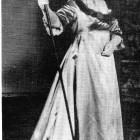Tosca 1957Sadler's Wells Opera
Read more about the opera Tosca
1957 was the year when Alexander Gibson was invited to make his debut at Covent Garden, conducting Tosca, with a cast including Zinka Milanov and Franco Corelli. A recording of one of those performances was one of the first issues in the Royal Opera's historic series, for very good reason. It was clearly one of Gibson's favourite operas, so it seems surprising that he did not introduce it to the Scottish Opera repertoire until 1980.
This cast featured Victoria Elliott in what was widely reckoned to be her best role. She had the power required for the dramatic sections, and the control to allow her to sing 'Vissi d'arte' lying prone, propped on one elbow, in the manner made famous by Maria Jeritza forty years earlier.
Ronald Dowd, was an Australian who would spend much of the next fifteen years at Sadler’s Wells as a dramatic tenor. With Scottish Opera he sang Otello, Aeneas and Florestan.
Harold Blackburn was also a leading member of the Sadler’s Wells company during that time, and he was one of the Scots who encouraged Gibson in his attempt to establish a Scottish company.
Patricia Johnson did go on to sing princpal roles with the Wells, such as Carmen, but spent most of her career as a leading mezzo at the Deutsche Oper, Berlin. She returned occasionally to the UK, either as a member of that company at the 1975 Edinburgh Festival, or as Kostelnička in Jenůfa at Covent Garden in 1977.
Dundee Press Report
Dundee Courier & Advertiser: Saturday, April 13, 1957
Brilliant singing and acting in “Tosca”
'Out and out 'thrillers' like Puccini's Tosca given at the Dundee Gaumont last night by the Sadler's Wells Company, are rare on the operatic stage. In many cases, plots are not opera's strong point, but this one is grim and red corpuscled enough to merit an “X” certificate. Realism starts from the single chord which raises the curtain. It runs through one murder, one execution and one suicide - thus disposing of all the principal characters. Before the demises there is a little torture (offstage) for good grisly measure.
'This lurid music-drama was brilliantly sung and acted by Victoria Elliott as Tosca, Ronald Dowd as Mario, and John Hargreaves as the sinister Scarpia, chief of police. The highly dramatic second act in Scarpia's palace, in which Tosca stabs the villain in his moment of triumph, drew prolonged applause from the packed audience. It was a tribute to the emotional intensity with which these two artistes had created visual and musical excitement. In this act, Puccini's theatrical genius brought off a masterstroke with Tosca's despairing aria “Love and Music”. Victoria Elliott reached the peak of her remarkable study of the part with her performance of this favourite. But her powerful dramatic soprano and her realistic acting were continuing factors through the opera.
'Tosca introduced us to still another leading tenor in Ronald Dowd, whose ardent voice was able to give thrill to Puccini's characteristic type of sensual melody. One admired, too, his facility to impart tenderness to his tone where needed. Two of the opera's greatest favourites, the arias “Strange harmony” and “When the stars are brightly shining” brought him spontaneous plaudits.
'A baritone with fine volume, John Hargreaves created the credibility of the opera with his magnificent study of Scarpia. Malevolence resided equally in his singing and acting. Stabbed by Tosca at the end of Act II, he rolled down the stairs on to the stage so realistically that it seemed quite a relief to see him uninjured, taking his applause with the others at the end of the opera.
'The beauties of the score and its urgent drama were well realised by Alexander Gibson, the conductor, and the Wells orchestra.'
The cast shown is that for the Dundee performance.
Sadler's Wells Opera on tour in Scotland - 1957
The four week tour of Scotland for once omitted Edinburgh, going to Aberdeen and Dundee instead. Having been without professional opera since before the war, Dundee had received hugely successful visits by Carl Rosa in 1955 and 1956, so it was logical for the Wells to follow on, as they did annually with equal success until the theatre again became unavailable in 1961. The repertoire in each city was similar but for Dundee not hearing Il trovatore (an extra Bohème instead) and Glasgow also getting Eugene Onegin and Puccini's Trittico.
The works performed were: Mozart (Marriage of Figaro); Flotow (Martha); Verdi (Trovatore, Traviata); Smetana (Bartered Bride); Tchaikovsky (Eugene Onegin); Puccini (Bohème, Tosca, Tabarro, Suor Angelica, Gianni Schicchi).
The tour schedule was as follows:
Aberdeen, w/c 1 April: Mon 1 Traviata; Tue 2 Tosca; Wed 3 Martha; Thu 4 Trovatore; Fri 5 Marriage of Figaro; Sat 6 mat Bartered Bride; Sat 6 eve Bohème.
Dundee, w/c 8 April: Mon 8 Traviata; Tue 9 Bohème; Wed 10 Marriage of Figaro; Thu 11 Martha; Fri 12 Tosca; Sat 13 mat Bohème; Sat 3 eve Bartered Bride.
Glasgow, w/c 15 April: Mon 15 Trovatore; Tue 16 Bohème; Wed 17 Tosca; Thu 18 Trovatore; Fri 19 Martha; Sat 20 Mat Bartered Bride; Sat 20 eve Tosca.
Glasgow, w/c 22 April: Mon 22 Marriage of Figaro; Tue 23 Martha; Wed 24 Tabarro & Suor Angelica & Gianni Schicchi; Thu 25 Marriage of Figaro; Fri 26 Eugene Onegin; Sat 27 mat Traviata.; Sat 27 eve Bartered Bride.
Performance Cast
- Cesare Angelotti former Consul, now a political prisoner
-
John Probyn (Apr 12)
- Sacristan
-
Harold Blackburn (Apr 12)
- Mario Cavaradossi a painter
-
Ronald Dowd (Apr 12)
- Floria Tosca a famous singer
-
Victoria Elliott (Apr 12)
- Baron Scarpia Chief of Police
-
John Hargreaves (Apr 12)
- Spoletta police agent
-
Rhys Williams (Apr 12)
- Sciarrone police officer
-
Cecil Lloyd (Apr 12)
- Shepherd boy
-
Patricia Johnson (Apr 12)
- Gaoler
-
John Shiels (Apr 12)


